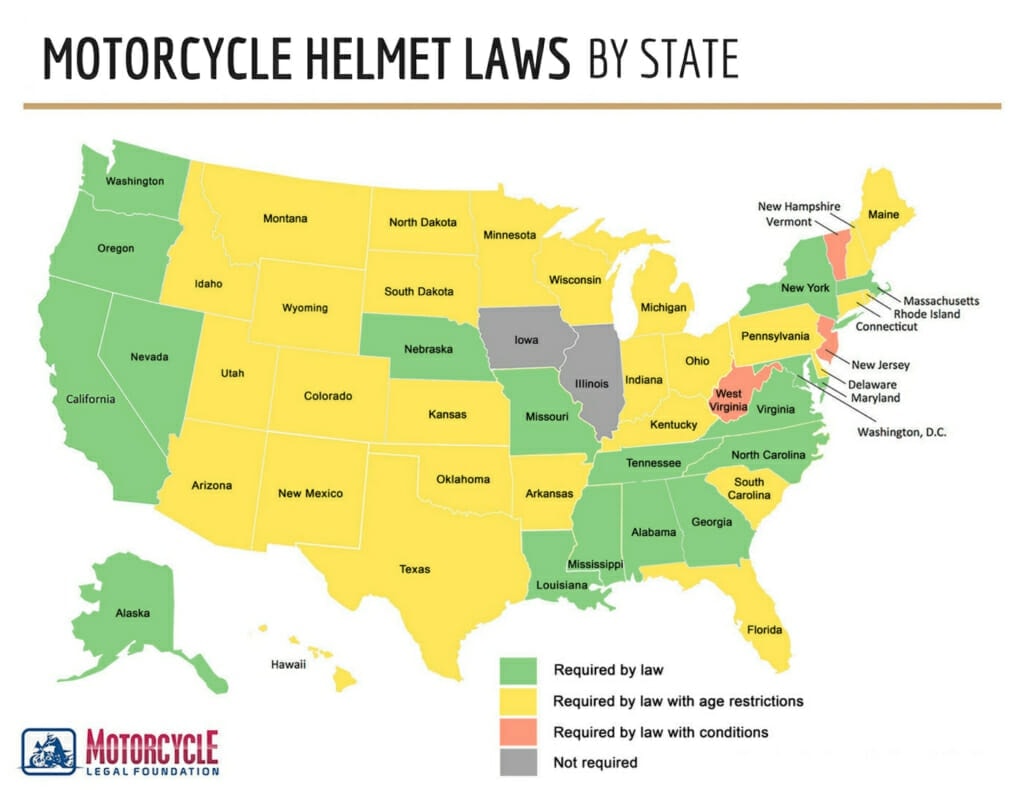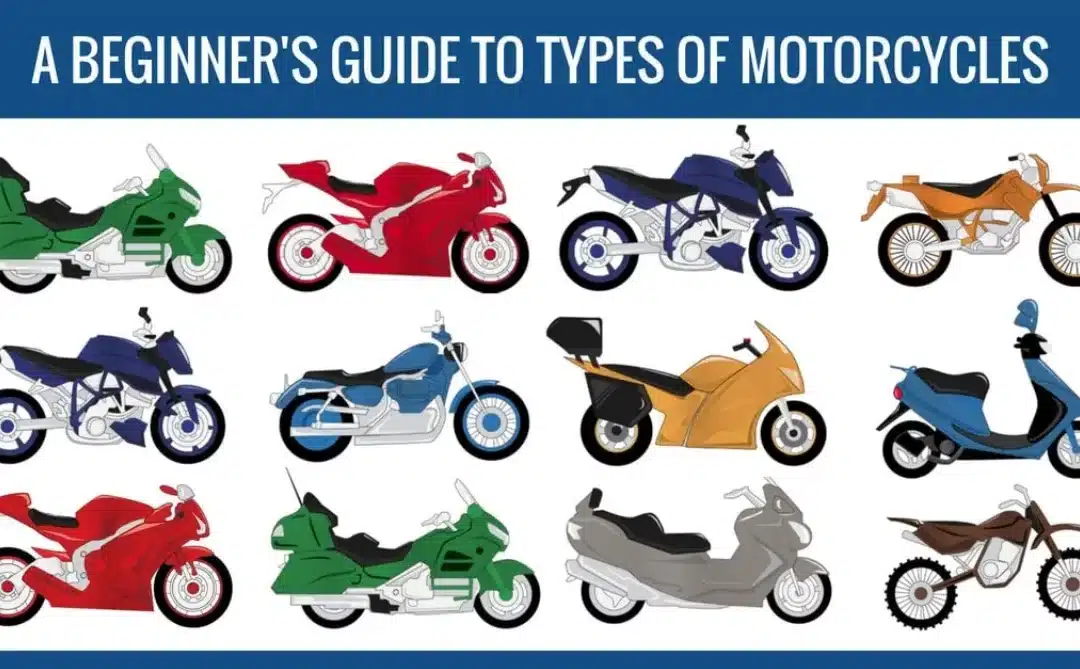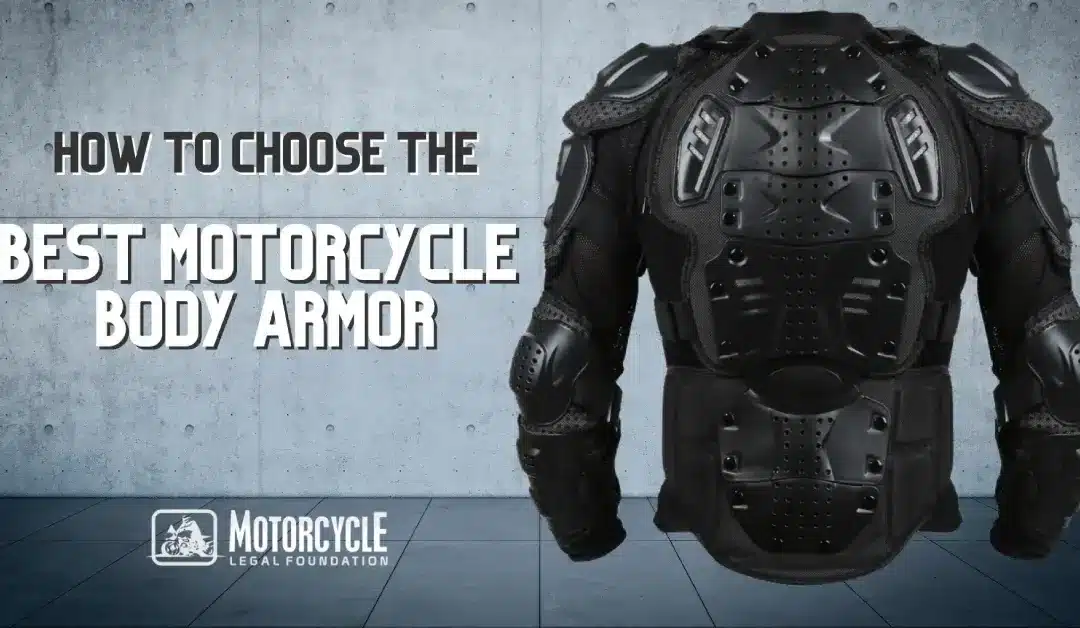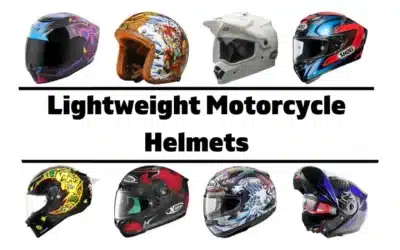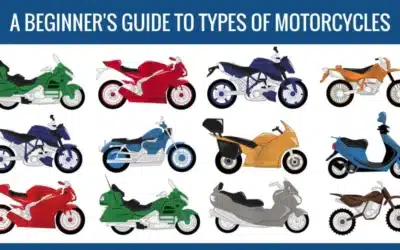One of the main attractions of riding motorcycles, the ability to experience traveling the open road without being encased by a metal cage, also represents the biggest safety issue for motorcycle operators and their passengers. A motorcycle rider does not have steel frame, airbags, seatbelts and other safety features designed to protect the occupants of other vehicles from injury in a crash.
For most motorcycle riders, the only thing protecting their head in a collision are their helmets. According to the Centers for Disease Control and Prevention, wearing a helmet reduces the risk of death by 37% and the risk of suffering an injury to the head by 69%.
Although the data support the conclusion that wearing helmets save lives and reduce head injuries, the National Highway Traffic Safety Administration reports the use of helmets by riders and passengers recently posted a 2% drop. A reason why you do not see universal use of helmets within the motorcycle community may be due to a lack of consistency among the states in their laws regulating helmet use by operators and their passengers.
Table of Contents
Add a header to begin generating the table of contents

Is It Illegal To Ride A Motorcycle Without A Helmet?
If you take a trip across the country on your motorcycle, you know that changing lanes on the highway without signaling could lead to a traffic ticket. It does not matter what state you happen to be riding through because of consistency in laws from one state to another.
Unless you happen to be in the state where you live and received your license to operate a motorcycle, you may not be able to answer a simple question that could keep you from being pulled over by the police: Is it illegal to ride a motorcycle without a helmet? Some states make helmets mandatory for all operators and passengers. Other states only require helmets for young rides, while some states do not require them for anyone. The only way to know how to comply with the law is by looking it up in advance.
Penalty For Not Wearing A Helmet On A Motorcycle
Just as the requirement to wear a helmet while riding on a motorcycle differs from state to state, so do the penalties imposed for a violation in those states with a helmet law. To get an idea of the types of penalties you may face for violating a state’s helmet law, here is a look at the laws in four representative states:
- California
- Texas
- New York
- Florida
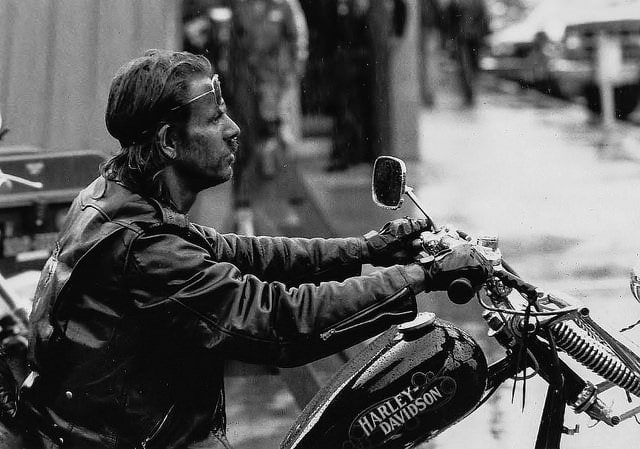
Penalty for violating the helmet law in California
The California law requires operators and passengers regardless of their age to wear a helmet that meets DOT safety standards and is properly fastened to the person’s head with the straps affixed to the helmet. A violation of the law is punishable by a fine in an amount as determined by a court.
Penalty for violating the helmet law in Texas
Texas, unlike California, has partial rather than universal helmet law generally applicable to individuals younger than 21 years of age. A violation of the law is not a primary offense, which means that police may not stop a motorcyclist solely to determine if the person is violating the helmet law.
An officer would need another violation of the law as the reason for making the stop. A violation of the helmet law is a misdemeanor punishable by a fine of not less than $10 or more than $50.
Penalty for violating the helmet law in New York
Riding on a motorcycle without a helmet that is properly held in place on your head using the straps affixed to the helmet is a violation of the law. The penalty for violating the helmet law in New York is a fine of up to $100, up to 30 days in jail, or a combination of both a fine and jail confinement.
Penalty for violating the helmet law in Florida
If you are at least 21 years of age and have an insurance policy with at least $10,000 in medical coverage for injuries you may suffer in a motorcycle crash, Florida law does not require that you wear a helmet. A violation of the law is only a noncriminal traffic infraction not punishable as a moving violation for which you can be ordered to pay a fine plus court costs and administration fees.
Motorcycle Helmet Laws Throughout The United States
Each state has its own laws pertaining to motorcycle helmets. They range from universal helmet laws, such as in California, requiring that a helmet be worn by anyone riding on a motorcycle regardless of the person’s age to states, such as Illinois, that do not have laws pertaining to the use of helmets by operators or passengers. Use the following summary of the motorcycle helmet laws in each state to stay in compliance with the law wherever your riding takes you.
More Important Motorcycle Laws
Motorcycle Wheelies Laws
Motorcycle Eye Protection Laws
Motorcycle Noise Restriction Laws
Motorcycle Passenger Laws
Motorcycle Daytime Headlight Laws
Motorcycle Lane Splitting Laws
If you ride on a motorcycle in Alabama, you must wear protective headgear having a hard exterior shell capable of resisting impact and penetration. Inside the helmet must be a shock-absorbing cradle that maintains a protective separation between the outer shell and the rider’s head. The law specifies the types of materials to be used for the exterior and interior of the helmet. Riders must use a chinstrap that is permanently affixed to the helmet to secure the helmet in place on their heads.
Passengers of all ages and operators younger than 18 years of age must wear a helmet when riding on a motorcycle. Riders with learner’s permits, regardless of the person’s age, must wear a helmet.
Anyone who is younger than 18 must wear a helmet whether operating or riding on a motorcycle. Riders and operators who are 18 years of age and older have the option of not wearing a helmet. Helmet requirements do not apply to mopeds, which are defined as two-wheeled vehicles with a maximum engine displacement of 50 cubic centimeters or greater and that cannot achieve a maximum speed in excess of 25 mph.
Arkansas motorcycle helmet law
All operators and riders younger than 21 years of age must wear a helmet while riding. Riders of three-wheeled motorcycles that are equipped with a cab and windshield and engines of 20 hp or less are exempt from having to comply with the helmet law.
California motorcycle helmet law
Anyone on a motorcycle must wear a helmet that meets U.S. Department of Transportation or California standards for safety. The helmet must be securely fastened using a chin strap affixed to the helmet. Fully enclosed three-wheeled vehicles at least seven feet in length and at least four feet wide with an unladen weight of at least 900 pounds are exempt from the helmet requirement.
Colorado motorcycle helmet law
Operators and passengers who are younger than 18 years of age must wear a helmet that meets DOT safety standards. The helmet must be securely fastened to the person’s head while the motorcycle is in motion by using a chin strap that is permanently affixed to the helmet.
Connecticut motorcycle helmet law
Operators and passengers who are younger than 18 years of age or older operators riding with only a learner’s permit must wear a helmet that meets federal DOT safety standards
Delaware motorcycle helmet law
A unique twist exists in the Delaware helmet law. Operators and passengers up to 19 years of age must wear a helmet that meets federal safety specifications. Although the law does not require riders and their passengers who are 19 or older to wear them, they must have helmets in their possession while riding on a motorcycle.
District of Columbia motorcycle helmet law
All operators and passengers riding motorcycles in Washington, D.C. must wear helmets meeting standards for safety established by the American National Standards Institute.
If you are younger than 21 years of age, you must wear a helmet when riding on a motorcycle in Florida. Generally, motorcyclists who are 21 years of age and older also must wear helmets, but the law allows them to ride with a helmet provided the person has proof of a medical insurance policy providing a minimum of $10,000 in coverage in the event they suffer injuries while riding.
Florida helmet laws do not apply to anyone who is at least 16 years old and riding on or operating a motorcycle equipped with maximum engine displacement of no greater than 50 cubic centimeters that is incapable of reaching speeds in excess of 30 mph.
All motorcycle operators and their passengers must wear helmets meeting safety standards adopted by the state commissioner of public safety. The helmet requirement does not apply to vehicles with an enclosed cab or motorized cart, nor does it apply to three-wheeled motorcycles exclusively used for agricultural purposes.
A properly secured helmet must be worn by all operators and their passengers who are younger than 18 years of age while riding on a motorcycle. Riders who are at least 18 years older are not required by law to wear a helmet.
The state director of motor vehicles sets safety standards that motorcycle helmets used in Idaho must meet or exceed. State law does not have a universal helmet law, so only operators and passengers younger than 18 must wear a helmet.
Illinois motorcycle helmet law
The law in Illinois does not require riders or operators to wear helmets while riding motorcycles.
Anyone riding on a motorcycle who is under 18 years of age or operating with a learner’s permit must wear a helmet. A helmet is optional for all other riders.
The state repealed its universal helmet law requiring use of helmets by all riders on a motorcycle in 1976. Until the legislature decides otherwise, wearing a helmet while riding is optional regardless of your age.
Anyone under 18 years of age must wear a helmet when riding on a motorcycle. The state repealed its universal helmet law in 1976, so helmets are optional for riders once they turn 18.
Kentucky motorcycle helmet law
A helmet must be worn by anyone who is under 21 years of age and riding on a motorcycle. A helmet is mandatory for anyone, regardless of age, riding with a learner’s permit or who have had a motorcycle operator’s endorsement on their driver’s license for less than one year.
Louisiana motorcycle helmet law
A universal helmet law has been in effect in the state since 2004, so anyone riding on a motorcycle must wear a DOT-certified helmet.
A universal helmet law was repealed in 1977 and replaced with a law requiring helmets for all passengers 18 years of age and younger. Riders with a learner’s permit and those whose license was issued less than 12 months ago must wear helmets.
Maryland motorcycle helmet law
All riders on a motorcycle must wear a helmet under the universal helmet law enacted by the state in 1992.
Massachusetts motorcycle helmet law
The state enacted a universal helmet law in 1967 requiring that all riders wear a helmet while on a motorcycle operated within the state.
Michigan motorcycle helmet law
The state repealed its universal helmet law in 2012 and implemented a requirement that anyone younger than 21 must wear a helmet while riding on a motorcycle. Operators who are 21 or older may ride without a helmet provided their motorcycle operator’s endorsement was issued at least two years ago or passed an approved motorcycle safety course. Both operators and passengers who choose to ride without a helmet must have medical benefits insurance with minimum coverage as established by state law.
Minnesota motorcycle helmet law
All riders younger than 18 years old must wear a helmet when riding a motorcycle. A helmet is optional for anyone 18 or older, but you must wear a helmet, regardless of age, if you only possess a learner’s permit.
Mississippi motorcycle helmet law
The state enacted its universal helmet law in 1974, so anyone riding a motorcycle must wear a DOT-certified helmet.
Missouri motorcycle helmet law
The state changed its motorcycle helmet law effective August 28, 2020, to make wearing a helmet optional for riders and passengers who are 26 years of age and older provided they have health insurance coverage. Motorcycle operators riding with a learner’s permit must wear a helmet regardless of their age.
The state repealed its universal helmet law in 1977, but it retains a helmet requirement for riders younger than 18 years of age.
Nebraska motorcycle helmet law
The state enacted a universal helmet law in 1989, so anyone riding on a motorcycle must wear a DOT-approved helmet. If you live in Nebraska or plan to travel through the state on a motorcycle, be aware that a proposal to repeal the universal helmet law was introduced in early 2021. The proposed legislation has not been acted upon and remains pending, so check for updates on its status.
The state enacted universal helmet legislation in 1972. Anyone riding on a motorcycle in the state, regardless of age, must wear a DOT-approved helmet.
New Hampshire motorcycle helmet law
Anyone who is under 18 years of age and riding on a motorcycle must wear a DOT-approved helmet, helmets are optional for riders who are 18 and older. A curious provision of the helmet law in New Hampshire states that the helmet requirement for riders younger than 18 will be void if changes to the federal law no longer require them as a condition for the state to receive An interesting provision of the New Hampshire helmet law says the requirement that young riders wear helmets will be void in the event the receipt of federal funds by the state is no longer conditioned on it.
New Jersey motorcycle helmet law
The state has a universal helmet law that was enacted in 1968. Anyone riding a motorcycle must wear a helmet.
New Mexico motorcycle helmet law
The state repealed its universal helmet law in 1977. Currently, helmets must be worn by all riders younger than 18 years of age. Wearing a helmet is optional at the rider’s discretion for anyone 18 or older.
New York motorcycle helmet law
The state enacted a universal helmet law in 1967 making it mandatory for anyone riding on a motorcycle to wear a helmet.
North Carolina motorcycle helmet law
The state universal helmet law enacted in 1968 remains in effect. Anyone riding on a motorcycle must wear a helmet.
North Dakota motorcycle helmet law
Since the repeal in 1977 of the state’s universal helmet law, only operators and passengers younger than 18 years of age must wear a helmet.
Anyone 18 years of age or younger must wear a helmet while riding on a motorcycle. Passengers, regardless of age, must wear a helmet when the law requires that one be worn by the operator of the motorcycle. Motorcycle operators who have been licensed for less than one year must wear a helmet regardless of the person’s age.
Oklahoma motorcycle helmet law
Repeal of its universal helmet law in 1976 means that wearing a helmet while riding a motorcycle is optional at the discretion of the individual. Helmet use while riding a motorcycle remains mandatory for anyone 18 years of age or younger.
Anyone riding on a motorcycle must wear a helmet under the state’s universal helmet law enacted in 1988.
Pennsylvania motorcycle helmet law
Although it repealed its universal helmet law in 2003, helmets remain as mandatory equipment for anyone younger than 21 years of age while riding on a motorcycle. Anyone licensed for less than two years who operates a motorcycle must wear a helmet or must have completed a motorcycle safety course. Passengers, regardless of age, must wear a helmet when the law requires a person operating the motorcycle to wear one.
Rhode Island motorcycle helmet law
It repealed its universal helmet law in 1976, but the state retains a helmet requirement for anyone younger than 21 years of age while riding on a motorcycle. A helmet also must be worn by anyone, regardless of age, who has been licensed to operate a motorcycle for less than one year.
South Carolina motorcycle helmet law
Use of a helmet while riding on a motorcycle is optional for anyone who is at least 21 years of age. The state retains a mandatory helmet law for operators and passengers younger than 21 years old.
South Dakota motorcycle helmet law
The state does not require anyone 18 years of age or older to use a helmet while riding a motorcycle. Anyone younger than 18 must wear a helmet while operating or riding on a motorcycle.
Tennessee motorcycle helmet law
Anyone riding on a motorcycle must wear a DOT-approved helmet while doing so according to the universal helmet law enacted in the state in 1967.
After repealing its universal helmet law in 1997, Texas enacted legislation making use of a helmet mandatory for all riders, but it allows anyone who is 21 or older to ride without a helmet provided the person has completed a motorcycle safety course approved by the state or is covered by a policy of medical insurance.
Anyone younger than 21 years of age must wear a helmet while riding on a motorcycle. The state repealed its universal helmet law in 1977, so anyone 21 and older has the option to ride without a helmet. The law does, however, offer an incentive for you to wear a helmet in the form of a small reduction of $8 in the fine imposed by a court to anyone wearing a helmet when issued a ticket for a moving violation for riding a motorcycle.
Anyone riding on a motorcycle must wear a helmet according to the state’s universal helmet law enacted in 1968.
Virginia motorcycle helmet law
A universal helmet law enacted in 1970 requires that all operators and passengers riding on a motorcycle wear a helmet.
Washington motorcycle helmet law
The state enacted a universal helmet law in 1990 requiring that anyone riding on a motorcycle must wear a helmet.
West Virginia motorcycle helmet law
Anyone riding on a motorcycle must wear a DOT-approved helmet according to the universal helmet law enacted by the state in 1971.
Wisconsin motorcycle helmet law
All operators and passengers younger than 18 years of age must wear a helmet while riding on a motorcycle. A helmet is optional for all other riders except for operators who possess only a learner’s permit who must wear a helmet regardless of age.
Since the repeal of its universal helmet law in 1983, only passengers and operators who are younger than 18 years of age must wear a helmet when riding on a motorcycle.
Keep It Safe, Keep It Legal
The mosaic of helmet laws confronting motorcycle riders makes it difficult to stay on the right side of the law when venturing outside of your home state. It has been proven that wearing a motorcycle helmet, regardless of what the law may require, reduces injuries and deaths when things do not go as you may have planned.
Whether you get pulled over by local law enforcement for violating a state’s helmet law or suffer injuries in an accident, a motorcycle attorney provides an excellent source of legal advice that you can trust and rely upon. Wherever you happen to be, there is a motorcycle attorney available to help. All you have to do is make the call.

